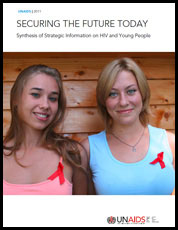News
New Report: Young People Central to Reversing AIDS Epidemic
- 26 July 2011
News
UNITED NATIONS, New York — Discussion heated up at the "Crossfire" panel discussion as youth leaders and decision makers from around the world engaged in a frank question and answer session about HIV and young people. During this side event of the High Level Meeting on Youth, UNFPA Deputy Executive Director Purnima Mane launched a report on HIV and young people called Securing the Future Today, which places young people at the centre of effective responses to AIDS.
The side event, convened in collaboration with UNFPA, ILO, Global Youth Coalition on HV/AIDS, Population Council and Catholic Relief Services, brought together young leaders and government policy-makers to discuss commitments made regarding young people and the AIDS response. It provided a platform for young people to have a direct dialogue with national Governments in order to encourage the scale up of HIV prevention and treatment services for young people as well as the active involvement and leadership of young people, including those living with HIV, in the AIDS response at all levels.
Participants looked for solutions to reach a shared vision of “Zero new HIV infections, Zero discrimination and Zero AIDS-related deaths” among young people.
To demonstrate their commitment to youth inclusion, high level officials from Botswana, India, Jamaica, Namibia and Sri Lanka responded to questions posed by youth leaders from the world over.
"How will you ensure effective coordination among ministries?"
"What is the Ministry of Youth doing to protect younger women?"
"What is being done to protect marginalized young people?"
The officials spoke about how their respective countries dealt with coordination between government ministries, gender equality for especially vulnerable young women, access to sexual and reproductive health services, and meaningful participation for young people living with HIV.
The new report says that global commitments will be achieved only if the unique needs of young women and men are acknowledged and their human rights fulfilled, respected, and protected.
It argues that in order to reduce new HIV infections among young people, achieve the broader equity goals set out in the MDGs and begin to reverse the epidemic, HIV prevention and treatment efforts must be tailored to the specific needs of young people.
"The ability of young people to manage their risks and vulnerability to HIV is not solely a function of individual behavior," said Ms. Mane as she addressed the crowded room. "It is also dependent on social, political and economic inclusion."

Recent epidemiology data from UNAIDS indicates that young people are leading the HIV prevention revolution by taking action to protect themselves from HIV. Young people’s sexual behaviors are changing and HIV prevalence among young people is dropping in 15 of the 21 countries most affected by HIV. However, in 2009, young people accounted for 41 per cent of all new HIV infections among adults, with 3,000 young people becoming newly infected with HIV each day. Also in 2009, 4.9 million young women and men were living with HIV worldwide.
The report highlights that young people are a key resource to reverse the global AIDS epidemic and lead the response in decades to come. But it stresses that the legal and policy barriers that prevent young people from accessing HIV services must be addressed, and young people should be engaged more effectively in the response.
According to the new report, to effectively advance the response among young people, there is a need to increase investments. However, it also cautions that simply directing more resources will not increase HIV testing and uptake of services among young people. Instead, empowering young people and particularly young women to exercise their rights to sexual and reproductive health, improve programmes for young people and repeal national laws and policies that restrict access to HIV services for young people is required to protect future generations from HIV.